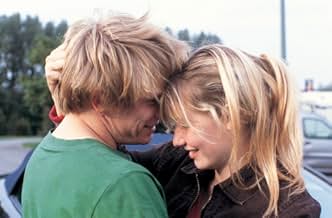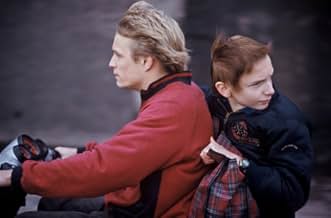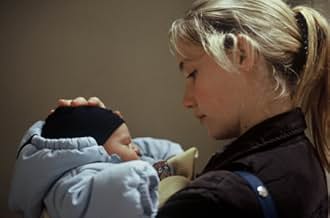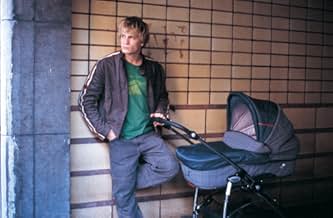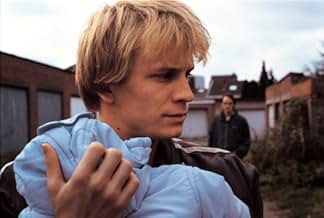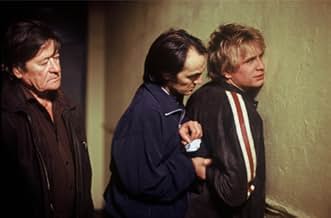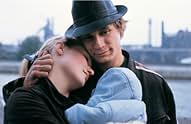CALIFICACIÓN DE IMDb
7.4/10
20 k
TU CALIFICACIÓN
Agrega una trama en tu idiomaBruno and Sonia, a young couple living off her benefit and the thefts committed by his gang, have a new source of money: their newborn son.Bruno and Sonia, a young couple living off her benefit and the thefts committed by his gang, have a new source of money: their newborn son.Bruno and Sonia, a young couple living off her benefit and the thefts committed by his gang, have a new source of money: their newborn son.
- Dirección
- Guionistas
- Elenco
- Premios
- 14 premios ganados y 21 nominaciones en total
Anne Gerard
- Commerçante
- (as Anne Gérard)
Leon Michaux
- Policier Commissariat
- (as Léon Michaux)
- Dirección
- Guionistas
- Todo el elenco y el equipo
- Producción, taquilla y más en IMDbPro
Opiniones destacadas
When the single mother Sonia (Déborah François) returns home with her newborn son, she finds that the baby's father Bruno (Jérémie Renier) had rented her apartment for a couple. She seeks out Bruno, who is a small time young thief that has a gang with two other teenagers, on the streets and they go to a shelter to stay during the cold night. On the next morning, they register the child with the name of Jimmy. When Bruno receives a proposal from his dealer for selling Jimmy for adoption for five thousand Euros, he steals the baby and sells him to his contact. However, when Sonia discovers what Bruno did, she faints, goes to the hospital and reports the transaction to the police. Bruno calls off the transaction and retrieves Jimmy, but has to pay to the dealers another five thousand Euros, in the beginning of his descent to hell and final redemption.
The low-budget "L'Enfant" is actually the realistic story of Bruno, an indifferent and alienated young scum originated from the upper class but without job for option that steals, lies, manipulates, wanders on the streets and seems incapable of displaying love, remorse or any other human feelings. Sonia is not well developed and the viewer never knows who she actually is and why she felt in love for Bruno. Jérémie Renier and Déborah François have awesome performances in the lead roles. The conclusion is disappointing since the final redemption of Bruno is inconsistent with his character. Maybe the intention of the writers and directors Jean-Pierre and Luc Dardenne is to give some hope to the audience instead of the expected dark and credible ending. My vote is eight.
Title (Brazil): "A Criança" ("The Child")
The low-budget "L'Enfant" is actually the realistic story of Bruno, an indifferent and alienated young scum originated from the upper class but without job for option that steals, lies, manipulates, wanders on the streets and seems incapable of displaying love, remorse or any other human feelings. Sonia is not well developed and the viewer never knows who she actually is and why she felt in love for Bruno. Jérémie Renier and Déborah François have awesome performances in the lead roles. The conclusion is disappointing since the final redemption of Bruno is inconsistent with his character. Maybe the intention of the writers and directors Jean-Pierre and Luc Dardenne is to give some hope to the audience instead of the expected dark and credible ending. My vote is eight.
Title (Brazil): "A Criança" ("The Child")
Bruno (Jérémie Renier, magnificent) and Sonia (Déborah François, who reminds me of a younger Julie Delpy) are immature, teen lovers. They live on the streets of Seraing, Belgium, getting money from Bruno's gang's petty crimes. Sonia gives birth to a baby boy, Jimmy, but Bruno is totally indifferent. He sells his newborn son without Sonia's consent, and she has a nervous breakdown when he tells her what he did. Bruno then goes against all odds to get Jimmy back, but it won't be an easy ride.
"L'Enfant" is a beautiful, raw poetry about children who haven't grown up, and have their own kids without even knowing how to care of themselves. This is a film of silences, gestures that say more than a thousand words. "L'Enfant" is the first film by Luc and Jean-Pierre Dardenne that I've had the opportunity to watch, and I couldn't be more satisfied. After reading great things about some of his other films - "La Promesse" (1996), "Rosetta" (Golden Palm at Cannes 1999), "Le Fils" (2002, Olivier Gourmet was awarded Best Actor at Cannes) -; now I understand why they're considered some of the most talented names making films nowadays. Their honesty and strength to tell this poignant story, which could easily become an absurd melodrama, is mindblowing. "L'Enfant" gave the Dardenne brothers a second Golden Palm at Cannes, and hopefully the pompous award will make more people curious to check this work of art. Nothing is as simple as it seems, and as we get into the nightmarish world of Bruno, we see he's not only an immature, cruel lad who sold his own kid, but someone who hasn't even begun to live.
Sad and remarkable, "L'Enfant" has some similarities with Hector Babenco's classic "Pixote - A Lei do Mais Fraco" (1981) and is certainly one of the year's best. 10 out of 10.
"L'Enfant" is a beautiful, raw poetry about children who haven't grown up, and have their own kids without even knowing how to care of themselves. This is a film of silences, gestures that say more than a thousand words. "L'Enfant" is the first film by Luc and Jean-Pierre Dardenne that I've had the opportunity to watch, and I couldn't be more satisfied. After reading great things about some of his other films - "La Promesse" (1996), "Rosetta" (Golden Palm at Cannes 1999), "Le Fils" (2002, Olivier Gourmet was awarded Best Actor at Cannes) -; now I understand why they're considered some of the most talented names making films nowadays. Their honesty and strength to tell this poignant story, which could easily become an absurd melodrama, is mindblowing. "L'Enfant" gave the Dardenne brothers a second Golden Palm at Cannes, and hopefully the pompous award will make more people curious to check this work of art. Nothing is as simple as it seems, and as we get into the nightmarish world of Bruno, we see he's not only an immature, cruel lad who sold his own kid, but someone who hasn't even begun to live.
Sad and remarkable, "L'Enfant" has some similarities with Hector Babenco's classic "Pixote - A Lei do Mais Fraco" (1981) and is certainly one of the year's best. 10 out of 10.
Dramatic, realistic, proposing honest portrait of an age, generation, near reality. A film about parenthood. Bitter, cold, well made. And about the build of responsability. All - gived in wise manner. With admirable force. A father. His son. A decision. And the transformation. And the price of option.
L'infant belongs to Sophie and Bruno, both feckless, petty criminals, in a seedy Belgian city. She has just come out of prison (?)with the newborn. She goes to their apartment but finds that Bruno has sublet the place to a bilious couple, so she has to track Bruno down at work trying to cadge small change from passers by. He is pleased to see her but diffident towards his son: Jimmy.
They spend the night in a shelter, or rather she does, as he cuts his time short to fence his stolen goods to a woman who drops a hint that if they're not up to raising a child they could adopt it out for a good price.
After showing us how they can only seem to communicate through adolescent rough housing, we are left with the distinct impression that they are too immature for parenthood. A few days later, while they wait in line, Bruno offers to walk the baby. He then sells it to a baby selling gang, and returns to show Sophie the wad of cash. Sophie passes out from shock.
We see not one wit of shame or guilt from Bruno up to this point. He is, we presume, an amoral street thug, out for how to make the next buck, and found the baby to good an opportunity to pass up for a sizable reward. Besides, given the empty life the baby will be looking forward to, the adoption by a better off couple doesn't seem to be bad for the child.
Sophie passing out seems to bring him to his senses. Is he remorseful? Does he love her? Up to this point all we have seen of their relationship is one of two vapid adolescent children, with no hint of any plans to make a future for their off-spring.
He carries her to a hospital and starts calling his go between to have the deal undone. At this point his motivation is left deliberately unclear. Is he doing so because he regrets his actions and needs to make it up to Sophie, or is he doing it because her accusations are over heard by the staff and the police will soon be carting him off to jail? In any event he manages to get the child back, giving up the E5,000 without a whimper, but then faces the angry brokers who are now out their E5,000. When he returns to the hospital with the baby the police are there and he makes up the story that he was just pretending to sell the child as revenge for her infidelity, and then calmly disowns the child as his.
Sophie refuses to talk with him and the police have to back off, and at this point in the movie we are no clearer to discerning any hint of empathy stirring in Bruno's pock marked face. I felt sorry for Sophie in her realization that her lover is as calloused as his feet, but presumed she would soon allow him back into her life. Yet as morally revolted as I was by Bruno, I still wanted to see if he could manage some kind of redemption.
The movie ends in leaving us to answer that question ourselves.
The crux of the movie is Bruno's character, or lack of it. He is no sociopath; he is not evil; his bland personality is as banal and unattractive as cold soup. He seems to not be dangerous, until faced with too much temptation to his greed. Yet he is difficult to hate. He is like that black sheep relative we all have and shake our heads about, so that we can whistle past the graveyard of our own inadequacies. He is what humanity can become when the spirit slumbers. He is society's unwitting sin eater.
They spend the night in a shelter, or rather she does, as he cuts his time short to fence his stolen goods to a woman who drops a hint that if they're not up to raising a child they could adopt it out for a good price.
After showing us how they can only seem to communicate through adolescent rough housing, we are left with the distinct impression that they are too immature for parenthood. A few days later, while they wait in line, Bruno offers to walk the baby. He then sells it to a baby selling gang, and returns to show Sophie the wad of cash. Sophie passes out from shock.
We see not one wit of shame or guilt from Bruno up to this point. He is, we presume, an amoral street thug, out for how to make the next buck, and found the baby to good an opportunity to pass up for a sizable reward. Besides, given the empty life the baby will be looking forward to, the adoption by a better off couple doesn't seem to be bad for the child.
Sophie passing out seems to bring him to his senses. Is he remorseful? Does he love her? Up to this point all we have seen of their relationship is one of two vapid adolescent children, with no hint of any plans to make a future for their off-spring.
He carries her to a hospital and starts calling his go between to have the deal undone. At this point his motivation is left deliberately unclear. Is he doing so because he regrets his actions and needs to make it up to Sophie, or is he doing it because her accusations are over heard by the staff and the police will soon be carting him off to jail? In any event he manages to get the child back, giving up the E5,000 without a whimper, but then faces the angry brokers who are now out their E5,000. When he returns to the hospital with the baby the police are there and he makes up the story that he was just pretending to sell the child as revenge for her infidelity, and then calmly disowns the child as his.
Sophie refuses to talk with him and the police have to back off, and at this point in the movie we are no clearer to discerning any hint of empathy stirring in Bruno's pock marked face. I felt sorry for Sophie in her realization that her lover is as calloused as his feet, but presumed she would soon allow him back into her life. Yet as morally revolted as I was by Bruno, I still wanted to see if he could manage some kind of redemption.
The movie ends in leaving us to answer that question ourselves.
The crux of the movie is Bruno's character, or lack of it. He is no sociopath; he is not evil; his bland personality is as banal and unattractive as cold soup. He seems to not be dangerous, until faced with too much temptation to his greed. Yet he is difficult to hate. He is like that black sheep relative we all have and shake our heads about, so that we can whistle past the graveyard of our own inadequacies. He is what humanity can become when the spirit slumbers. He is society's unwitting sin eater.
Although I have not seen all other Cannes' comp. films, I think this is a worthy winner of the Palm d'or. The film's scenery is gray Seraing, like the previous Dardenne films, and I think this is the first film in which the camera-work complements the scenery and story near perfectly. Scene's often contain only one or two shots, cutting right when everything has been said. Its one of the few films where I did not notice the camera (I'm a student cameraman), which should be the goal of every cameraman, at least in this style of film. The acting is very impressive (especially Jeremie Renier as Bruno), like previous Dardenne Films. The film seems the most accessible Dardenne so far, although it does not bore in simplicity (I saw it twice in one week, avant-premiere and sneak preview, and I liked the second time best).
¿Sabías que…?
- TriviaJimmy is played by 40 different babies.
- ConexionesFeatured in Smagsdommerne: Episode #3.17 (2006)
Selecciones populares
Inicia sesión para calificar y agrega a la lista de videos para obtener recomendaciones personalizadas
- How long is The Child?Con tecnología de Alexa
Detalles
- Fecha de lanzamiento
- Países de origen
- Sitios oficiales
- Idioma
- También se conoce como
- The Child
- Locaciones de filmación
- Rue de la Banque, Seraing, Liège, Wallonia, Bélgica(Sonia's apartment exteriors)
- Productoras
- Ver más créditos de la compañía en IMDbPro
Taquilla
- Presupuesto
- EUR 3,600,000 (estimado)
- Total en EE. UU. y Canadá
- USD 651,941
- Fin de semana de estreno en EE. UU. y Canadá
- USD 44,537
- 26 mar 2006
- Total a nivel mundial
- USD 5,507,396
- Tiempo de ejecución1 hora 35 minutos
- Color
- Mezcla de sonido
- Relación de aspecto
- 1.66 : 1
Contribuir a esta página
Sugiere una edición o agrega el contenido que falta

Principales brechas de datos
What is the Mexican Spanish language plot outline for L'enfant (2005)?
Responda

